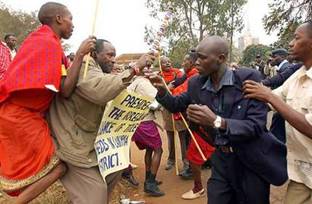|
|
Kenya Repulses Land Grabs Akin to Those in Zimbabwe
By Marc Lacey, New York Times Service
Nairobi, Kenia
September 5, 2004

NAIROBI, Kenya - In scenes reminiscent of Zimbabwe's land seizures, angry Masai tribesmen have begun marching onto sprawling ranches held by white settlers in Kenya's lush Rift Valley and claiming the tracts as their own.
But while President Robert Mugabe backed - and even encouraged - the forced redistribution of land in Zimbabwe as a way of righting colonial wrongs, the Kenyan authorities are rebuffing the recent trespasses by the Masai.
Police officers in riot gear are forcibly ousting the men, whom the government calls invaders, as well as their cattle. The number of Masai arrested exceeds 100. At least one person, an elderly Masai man, has died, shot during a confrontation with the police.
When a group of Masai recently tried to march from a park in downtown Nairobi to the British High Commission to highlight their rejection of colonial-era agreements that stripped them of their land, heavily armed police officers fired tear gas at the demonstrators and chased them for blocks. The Masai were carrying their traditional wooden staffs, knives and wooden clubs.
"As a government we are committed to the rule of law and the protection of private property," declared Amos Kimunya, the minister for lands and housing.
A reliance on the West.
Kenyan officials have no intention of following Mugabe's example. Uprooting the ranchers, government officials said, would be disastrous for the economy, which relies heavily on Western assistance and on tourism, a major source of hard currency.
On top of that, acceding to the Masai might encourage similar demands by the scores of other ethnic groups in Kenya, many of which have historic grievances, officials said.
The government has adopted a cautious approach to land reform. A new constitution being drafted proposes that the long leases granted to some wealthy ranchers, some of which exceed 950 years, be reduced to 99 years. When those leases expire, Kimunya said, it is possible that the land may be reallocated.
The land controversy started last month, around the 100th anniversary of an agreement reached between British colonialists and some Masai elders. The deal pushed the Masai far from their traditional turf in the Rift Valley, where a railway was being built, into reservations on far less desirable land.
Signed on Aug. 15, 1904, with the illiterate Masai using thumbprints, the document said the Masai leaders "of our own free will, decided that it is for our best interests to remove our people, flocks, and herds into definite reservations away from the railway line, and away from any land that may be thrown open to European settlement."
Rangeland becomes scarce.
It is not clear exactly what the Masai leaders received in exchange, but as the years have passed and the Masai population has grown, rangeland has become more scarce and the Masai's precious cattle have had far less land on which to graze. Masai leaders say the agreement ought to be invalidated because their predecessors were clearly taken advantage of by the white settlers.
"We're now squatters on our own land," said Ratik Ole Kuyana, a Masai tour guide who narrowly escaped arrest at the protest in Nairobi. "I'd rather spend my days in prison than see settlers spend their days enjoying my motherland. I think Mugabe was right."
In moving onto the private land, the Masai have not seized houses or harmed ranchers. But they have destroyed the electrical fencing that rings the properties and driven their herds onto the land to graze.
The area that has been the center of the protests is known as Laikipia, which sits just north of the equator near the towns of Nanyuki and Isiolo. It boasts spectacular views of snowcapped Mount Kenya and more endangered mammals than any other area in East Africa, including the black rhino, Grevy's zebra and reticulated giraffe.
Aggravating the conflict is a drought that has hit parts of Kenya hard, prompting President Mwai Kibaki to declare a state of emergency. Some Masai say they will not allow their cattle to die while settlers occupy land that used to belong to their Masai ancestors.
The landholders, many of them white settlers whose ancestors came to Kenya during colonial times, are nervously awaiting a resolution to the conflict.
"The young warriors move in and cut the fences and bring in their cattle," said one white rancher, describing the recent raids in northern Laikipia. "You get between 5,000 and 10,000 head of cattle on your land."
He called for firmer action against the trespassers, some of whom are from the related Samburu tribe.
|
|



